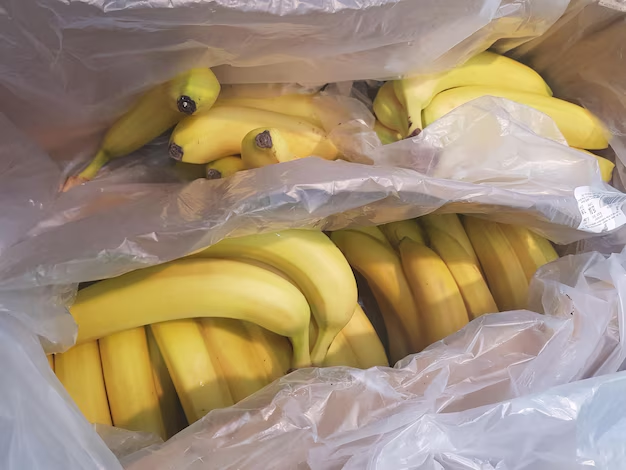Should You Store Bananas in the Refrigerator? Exploring This Common Kitchen Practice
Bananas are a beloved fruit around the world, known for their sweetness, versatility, and nutritional value. Whether blended into smoothies, sliced over cereal, or eaten on the go, the banana is a staple in many households. However, a common question often arises: Is it okay to put bananas in the refrigerator? This query might seem straightforward, but it comes with several layers worth unpacking. Throughout this exploration, we'll look at various aspects of banana storage, providing you with practical insights and guidance for your kitchen.
🍌 What Happens When You Refrigerate Bananas?
The Ripening Process
Bananas typically ripen at room temperature, which is an important phase in developing their flavor and texture. They release a gas called ethylene, which accelerates ripening. However, when you refrigerate bananas, this process is significantly slowed down. The refrigeration halts the production of ethylene, preserving the current state of ripeness and extending the fruit's shelf life. Refrigeration does not harm the inner fruit, preserving its freshness even as the peel darkens.
Impact on Texture and Taste
Refrigerating bananas affects their texture, maintaining a firmer feel longer than those kept outside the fridge. In terms of taste, refrigeration can help preserve the sweetness of ripe bananas by minimizing further ripening. It's crucial to understand that refrigeration is most effective for already ripened bananas. Storing unripened bananas in cold conditions may hinder their ability to ripen fully.
🥶 To Chill or Not to Chill: Factors to Consider
Purpose and Timing
Purpose: If you're planning to eat your bananas raw shortly, keeping them at room temperature might be your best bet. This ensures they naturally soften and sweeten. Conversely, if you're buying in bulk or planning to use them over several days, refrigeration could be advantageous.
Timing: Consider the condition of the bananas when deciding. Moderately ripe bananas are the best candidates for refrigeration as it halts further ripening at just the right stage. Unripe bananas, in contrast, should be left on the countertop to achieve the desired ripeness.
Size of Your Household
For larger households where bananas tend to be consumed quickly, keeping them at room temperature might suffice. However, for smaller households or individuals, refrigeration is an efficient way to prolong freshness and reduce waste.
Local Climate
In warmer climates, bananas ripen swiftly. In such settings, refrigeration can act as a necessary tool to pace the ripening process and extend the usability of bananas.
👨🍳 Tips for Storing Bananas Effectively
Ripen First: Allow bananas to reach your preferred stage of ripeness before refrigerating them to maintain flavor and texture.
Separate Bananas: Want to slow down ripening even further? Separate bananas from the bunch, as this limits the concentration of ethylene gas.
Seal Properly: Consider placing bananas in a loosely closed plastic bag before refrigerating to help contain ethylene, further slowing ripening.
Use the Right Compartment: Utilize the refrigerator's produce drawer, which is often designed to control humidity and ethylene gas effectively.
Consume Peeled Bananas Promptly: Once peeled, bananas should be consumed quickly regardless of refrigeration to prevent browning.
🤔 Pros and Cons of Refrigerating Bananas
Pros
- Extended Shelf Life: Offering longer-lasting bananas, especially useful for individuals who consume them sporadically.
- Preserved Flavor: Maintains sweetness of ripened bananas over a longer duration.
- Reduced Waste: Minimizing spoilage can lead to less food waste in the household.
Cons
- Change in Peel Appearance: Darkened peel can be unappealing, though typically doesn't affect the inner fruit.
- Potential Taste Variations: While many enjoy the taste of refrigerated bananas, others might notice slight changes or might prefer the richer flavor that comes with bananas ripened on the countertop.
- Requires Initial Ripening: Must wait until bananas are ripe before refrigeration to maintain optimal taste and texture.
🌐 Related Refrigerator Topics
Exploring whether to refrigerate bananas leads us to several other related queries within the realm of food storage:
👩🍳 Ethylene Producers and Consumers
Understanding how to store bananas can open up a broader discussion about foods that emit or absorb ethylene gas. Ethylene producers—like bananas, apples, and avocados—should generally be stored separately from ethylene-sensitive produce, such as leafy greens and berries, to manage ripening and spoilage.
🥦 Tips for Storing Other Fruits
Different fruits have varying storage needs. For instance:
- Citrus Fruits: Prefer cooler conditions and can be refrigerated to extend shelf life.
- Berries: Best kept in the fridge but should be washed only before consumption to prevent mold.
- Grapes: Store them in a breathable bag in the produce drawer for optimal freshness.
🌿 The Role of Humidity in Food Storage
Humidity levels in the refrigerator are crucial in maintaining freshness, especially for produce. Vegetables tend to thrive in higher humidity settings, while fruits generally prefer lower humidity to prevent moisture-induced rot.
🍏 Incorporating Tips in Everyday Life
Integrating effective storage practices means adapting to your eating habits, environmental influences, and logistical needs. Utilizing both room temperature and refrigerated conditions in tandem can help optimize fruit freshness and availability at all times.
Summary Tips for Storing Bananas and More 📝
- 🥶 Ripen bananas at room temperature, then refrigerate to maintain freshness.
- 🍌 For rapid ripening, keep bananas in a bunch on the countertop.
- 👨👩👦👦 Separate bananas to slow ripening if purchased in bulk.
- 🌡️ Local climate influences ripening speed—adjust storage accordingly.
- 🥬 Store ethylene-emitting fruits away from ethylene-sensitive produce.
In conclusion, deciding whether to refrigerate bananas or not depends on multiple factors, including ripeness, anticipated consumption timeline, and personal preferences. By considering these elements, you can make informed choices that help reduce waste, enhance taste, and fit your lifestyle. Applying these insights across various produce items in your home will ensure a more optimized, waste-reducing, and enjoyable culinary experience.

